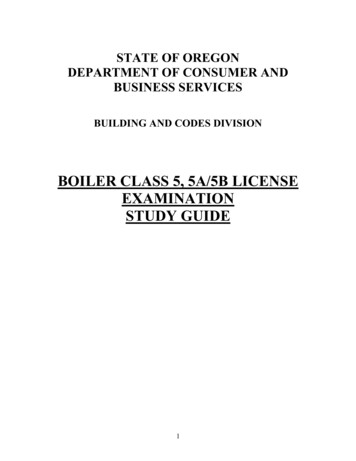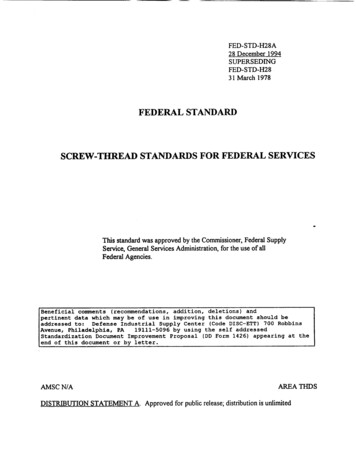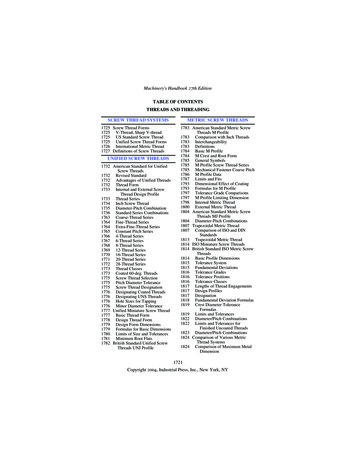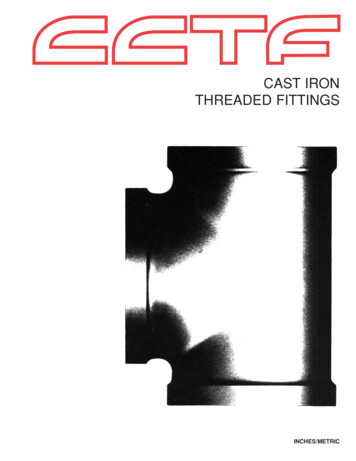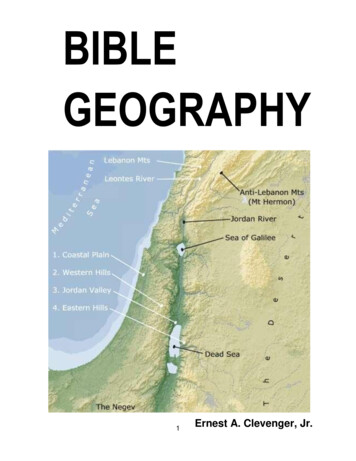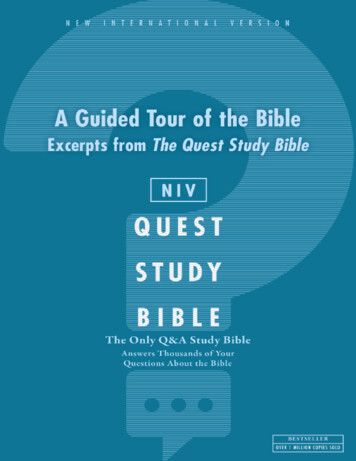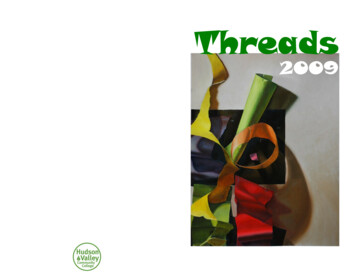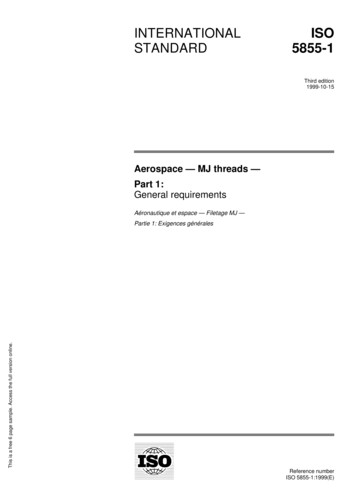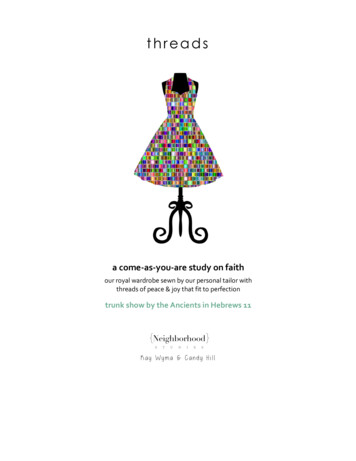
Transcription
threadsa come-as-you-are study on faithour royal wardrobe sewn by our personal tailor withthreads of peace & joy that fit to perfectiontrunk show by the Ancients in Hebrews 11Kay Wyma & Candy Hill
Isaiah 61:10-11I delight greatly in the Lord; my soul rejoicesin my God. For he has clothed me withgarments of salvation and arrayed me in arobe of righteousness, as a bridegroomadorns his head like a priest, and as a brideadorns herself with her jewels. For as the soilmakes the sprout come up and a gardencauses seeds to grow, so the SovereignLord will make righteousness and praisespring up before all nations.Copyright 2018, Kay Wills Wyma
a come-as-you-are study on faithtrunk show by the “ancients” in Hebrews 11Week 1Garden glasses: far-sighted, God-centered visionAbel, Enoch, NoahWeek 2Surrendered-Step ShoesAbrahamWeek 3Captive thoughts HatIsaac, Jacob, JosephWeek 4Manna-Provision ApronMosesWeek 5Work-through Shorts: not by might, by the SpiritJoshua, Rahab, Gideon, Shunammite womanWeek 6Identity Name-tagGideon, David, Jeremiah, Shadrack-Meshack-AbednegoRemember your leaders, who spoke the word of God to you. Consider theoutcome of their way of life and imitate their faith.Jesus Christ is the same yesterday and today and forever.Hebrews 13:7-8
what are you wearing?a come-as-you-are study on faithour royal wardrobe sewn by our personal tailor withthreads of peace & joy that fit to perfectionHave you ever looked in your closet and wondered, “What am I going to wear?” Thenstood and stood and stood without a clue as to the answer? Have you walked into agathering and done a little sizing up, a room-scan to be sure you’re good? Or room-scanconfirm the opposite, wish you had paid more attention to the invitation’s “attire,” thenfight your thoughts so they don’t ruin the whole day.Ever had a battle with your clothes drawer – good or bad? Maybe you spied a cute pairof pants, the ones that are saved for the day. As in the day when-I-can-get-back-into –those-things. Even though a decade (or 2!) and possible birth of 5 kids has passedbetween today and the last time you wore them? Or maybe you spy the work-outclothes that simultaneously offer such promise yet bring loads of self-assessment.Clothing-issues have been around since the beginning of time.It all started in a Garden where a pair scrambled to handle a major wardrobemalfunction by doing, trying, making, fixing, & working in order to be "dressed" right,to return whole in the presence of God – all in the form of a few fig leaves.But the Lord didn’t leave them in their shame.Those thousands of years ago, God came to them and clothed them in perfectprovision. The very best they could do for themselves wouldn’t have lasted in strongwind. But God cared for them with tailor-made outfits.It cost him to clothe them in a way that protected them and kept them warm. Theoutfits he made surpassed anything than they could have asked or imagined –especially considering the fact they didn’t even know what clothes were. Before adecision gone wrong, they had been pretty comfortable without them.But God didn’t stop there.1
He went a ginormous step further and provided them/us clothing not only on theoutside (provision), but also on the inside (salvation, holy redemption).And the clothes He has for us are out-of-this-world Royal-Wear that fits to perfection,sewn with threads of peace, joy, hope and contentment. A far cry from the 3-waymirror, florescent-lighting gauntlet the world offers for clothing.He clothed that pair in the Garden with outward items.The LORD God made garments of skin for Adam and his wife and clothed them. (Genesis3:21)Far beyond anything they could have imagined. Especially since the making of thegarments to clothe their outward bodies involved death and blood.But these outward clothes were only a shadow of what was to come. The LORD Godreaches to places we can’t touch, the soul-level source of who we are, and introducesthe ultimate death and blood for our inward clothes – to clothe our inside (salvation) aswell as outside (perfect provision):For He has clothed me with garments of salvation, He has wrapped me with a robe ofrighteousness (Isaiah 61:10)So God has a few items waiting for you in the dressing room, tailor-made, specifically foryou.They can be found on the top floor where He has put you on the special access list.Where the dressing rooms are bathed in luxury, flowing with milk and honey. And thedesigner label is out of this world, unlike anything you’ve ever known: Comfy-Couturewhere leggings meet the stratosphere of elegance.It’s a Spanx-free, make-up free zone. No pills, gels, fillers or regimes – the only diet hereis a steady stream of soul food – delicacies grown through the knowledge of Him,experienced by partaking in all He sets before us by which He reveals Himself.2
This confidence-infused come-as-you-are wardrobe wipes away any need to be or do inorder to be okay. No two outfits are alike. Each one is perfectly calibrated to ourpersonal specifications prepared in advance before we ever took our first breath.Why does it matter?It has everything to do with our identity and self-worth.In Threads, we will be looking at patriarchs of faith from Hebrews 11 as well as we learnwhat it means to be clothed “ in righteousness” and with “power from on high” ratherthan in our own effort and strength.Together we will consider faith – being sure of that for which we hope and certain ofwhat can’t see – by using articles of clothing, things we wear every day, to act asreminders. So that when we reach for our own glasses (sunglasses, readers, etc.) wemight be reminded to consider the lenses through which we see things. When we puton a hat, we’re reminded to consider captive thoughts attached to Truth. As we put onour shoes, we might think about the steps we will take in a day. That more and more ofthem will be surrendered-steps on God’s solid ground (even when that ground is water).And as we reach for these clothes, we can be reminded to wear the clothes God has sograciously and mercifully and abundantly provided rather than reach for the clothesthe world celebrates that we must weave ourselves: accolades, accomplishments,beauty, acumen, victories, numbers, and so much more.All of which pale in comparison (understatement) to the clothes we access throughfaith – a wardrobe beyond compare, immeasurably more than we could ever ask orimagine. A royal wardrobe purchased for and placed upon us in and by love thatsurpasses knowledge.Ephesians 3:17-19And I pray that you, being rooted and established in love, mayhave power, together with all the Lord’s holy people, to grasp howwide and long and high and deep is the love of Christ, 1and toknow this love that surpasses knowledge—that you may be filled tothe measure of all the fullness of God.Having the clothes is one thing, wearing – not just putting on, but owning – them isanother. Knowing Truth is one thing, applying truth is another. The power of Truthcomes in the practicing of it. In the same way, the power of faith comes by putting itinto motion through action steps of trust.Wearing the “clothes” we have been given rather than leaving them at the bottom ofthe drawer or the back of the closet to gather dust helps us believe what we’ve beentold to be true:3
1 Peter 2:9But you are a chosen people, a royal priesthood, a holy nation,God’s special possession, that you may declare the praises of himwho called you out of darkness into his wonderful light.Let’s not set this royal wardrobe to the side or save them for a special occasion;together let’s wear them today. This royal wardrobe is the “attire” for any occasion,every event, all situations.So far beyond outward covering, this outfit goes to soul-clothing and the question,“What is defining you?” Let's enjoy a trunk show together, worn by Hebrews 11Ancients who have gone before us. And as we daily don our own common articles ofclothing, let’s use them to remind us of the way He has clothed us.Luke 24:49“I’m going to send to you what my Father has promised; but stay inthe city until you have been clothed with power from on high.”HowThe goal of this study is to be in Scripture. Reading the word of God daily – to know theGod of the Word – without preconceptions or fear or whatever trips us up. Just read.Because, the Word of God amazingly informs itself and offers opportunity uponopportunity to grown in knowledge of Him. Scripture is an expansive and far-reachinglove story, intimately recorded and crafted for each of us.This study is set up to have us engage with Scripture five days of the week. Days 1-4focus on our ancient (a.k.a. faith hall of fame folks) style show models. Each day has aBible reading. If you do just that and stop there – terrific! But we’ve also providedprompt questions for the day. We begin with the contextual 5 W’s (who, what, where,when and why) that never fail to prompt consideration and ignite learning. Though theymight seem boring and repetitive, they are simple and easy to do any time you openyour Bible. Which is the goal – to open Scripture on more days than not equipped withsimple tools to be able to dive in and allow the Lord to guide and teach and care for ourneeds.You can stop there – at the contextual questions – or, keep going through promptquestions for further consideration. In fact, feel free to come up with your ownquestions. The goal here is to fall in love with God’s word as well as God himself.Toward that end, each day also has a Special Overlay prompt for us to keep a runninglist of specific things we learn about God in each day’s reading.4
The fifth day is called Garden to Table. Because if “in (God’s) presence there is fullnessof joy” and “at (his) right hand are pleasures forevermore,”1 let’s spend some timegetting to know him by pulling out specific attributes from passages of Scripture. Thatis the goal in Garden to Table as well as daily Special Overlay prompts – a time topractice reading simply to know God.Days 6 & 7 are yours to do with as you’re led. Maybe it’s mindful-rest, further reading orlooking back over the week and re-reading (how fun!) and journaling, whatever blessesyou. Jotting simple notes on what God is teaching us about ourselves and mostimportantly about Him helps solidify (possibly set to memory) Truth to inform our days.That said, this is not meant to overwhelm. Do what you can, when you can.Remember this is a come-as-you-are gathering. Bite off the amount you can chew andlinger in the goodness of God’s Word as you are led to consume it. Simply reading thepassages each day or over the weeks will prove to be a blessing.Each day:§ Begin with PRAYER: “Lord, open my eyes that I might see what you have to showme in your Word.” (Psalm 119:18).§ Read the passage. So, start by reading – not just reading by seeing the words, butgoing a step further and thinking about them. Park preconceived ideas, seebeyond what may be familiar. Ask God to open our eyes and ears to be able to seeand hear what is available. The Bible is truly God’s “living word” – you never knowwhat beautiful nuggets of truth are literally at your fingertips.After reading, use the lines provided to journal what you observe/learn. Promptquestions are included. They are simply prompts that begin with context: the 5W’s: who, what, when, where & why. It doesn’t have to be detailed – and somemight be hard to distinguish – just a quick broad overview to help us understandwhat’s going on:- Who: Who are the players involved? Who is the audience? Who isspeaking? Who is the author? The audience? - What: What are they talking about? Is it a Psalm/song of praise or a storyor a directive? It could be several things.- When: what period of time/what was happening- Where: the place, surroundings- Why: the purpose - is it a promise, a command, a caution, 1Psalm 16:11b ESV5
Followed by a variety of broad questions that will hopefully spur more questions.Just so you know, the when and where are often obscure – so don’t let anything getyou bogged down.The day’s reading is/may be followed by:§ Special Overlay: More than anything, our hope is that we will all fall in love withScripture – truly the greatest love story ever told: God’s love for us – and that wewill fall in love with our Creator. Each and every day, through all the steps ofinductive study and whatever other ways we interact with the passages, may oureyes and ears be ever open to see and hear God’s words about Himself. Why notkeep a running list of what we learn about God in each day’s reading?Who He Is: God is: faithful, trustworthy, a sanctuary, the sameyesterday/today/forever, .The things He does (explicit/implied): God: hears, knows my name, is LORD,never wavers, always says what He means and means what He says, speaks .The things He says, literally: “But now, this is what the LORD says ”Most importantly, read to know God. This incredible living word is God’s Word. There isso much to know about him and He has put himself forth from Genesis to Revelation.The most amazing part of Hebrews chapter 11 is not the characters it outlines, but theconstant behind each of them. The one true God is the Lead, the constant, in eachperson’s story. The One who is the author and perfecter of their faith. And, fastforward/good news, He is the author and perfecter of our faith too!So - we study the Word of God to know the God of the Word and “to be transformedby the renewing our mind” (Romans 12). The goal is not to complete the tasks but toknow Him and live in light of His Word, will and ways.And, as we study, let’s always be mindful of applications:-What does this text teach me about God?What does this text tell me to do?What truths (or promises) do I need to claim?What thought(s) will I carry throughout the day?Remember, this time in Scripture is for YOU. It’s meant to be a blessing, not a burden. Ifit’s too much, do only what you can do. It’s not a race or a good-student exercise. It’ssimply an opportunity to grow in our knowledge of God – walking through Scripturetogether.If there’s something you bump into where a little more information would be helpful, byall means LOOK further. We have access to terrific guidance from outside sources. Dr.Constable’s Sonic Light, Bible.org, Got Questions are just a few.6
Each week, we will have the opportunity to gather and discuss in person, but if youcan’t be there – connect at neighborhoodstudies.com/blog where the weeklydiscussions corresponding with each lesson will be posted.Linger and EnjoyAs we read Scripture to know God, we’ll learn about all the ways that HE is faithful.We’ll see over and over that He never leaves us to walk alone – and that He knows us byname, because we are his.Spend time in prayer – ask God to make His Word come alive. Ask the Lord to revealHimself in new and meaningful ways. Journal below your thoughts, hopes,apprehensions, and prayers over the next few weeks.Show me your ways, LORD,teach me your paths.Guide me in your truth and teach me,for you are God my Savior,and my hope is in you all day long.Remember, LORD, your great mercy and love,for they are from of old.Psalm 25: 4-6We’re excited and hope you are too. This is a come-as-you-are party, simply as you are.No worries about what you bring (or don’t bring) to the table. Together, let’s ask theLord to keep our hearts anchored in Him, to teach us and to help us in our unbelief.More than anything HAVE FUN. Enjoy and sink into all the wonderful things (evenwhen some may be hard to swallow) the Lord has to share and teach us about himself.And more than anything, sink into our identity as daughters of The King, our AbbaFather.We usually include a brief Bible Overview at this point. We’ve put it at the end of thematerial so it’s easy to find and reference.(And please forgive any typos - there may be a few J)7
8
Revelation 19:8It was given to her to clothe herself in fine linen,bright and clean 9
10
Week 1Garden GlassesGod-Centered, Far-Sighted, Eternal Perspective Visionabel, enoch, noahIn the Garden, all was perfect as the Lord God Creator (Elohim) made it to be. Includingthe fact that He purposefully, knowingly placed in man’s path a stumbling block. God’sall-access pass was limited by two trees from which man was not to eat. Which was allgood and fine until man’s eyes were lured away from seeing through God’s lenses toseeing through the world’s lenses.“Now the serpent was more crafty than any of the wild animals the LORD God had made.He said to the woman, “Did God really say, ‘You must not eat from any tree in thegarden’?”The woman said to the serpent, “We may eat fruit from the trees in the garden, but Goddid say, ‘You must not eat fruit from the tree that is in the middle of the garden, and youmust not touch it, or you will die.’”“You will not certainly die,” the serpent said to the woman. “For God knows that whenyou eat from it your eyes will be opened, and you will be like God, knowing good and evil.”When the woman saw that the fruit of the tree was good for food and pleasing to the eye,and also desirable for gaining wisdom, she took some and ate it. She also gave some to herhusband, who was with her, and he ate it. Then the eyes of both of them were opened,and they realized they were naked; so they sewed fig leaves together and made coveringsfor themselves.” (Genesis 3: 1-7)Their eyes moved from God-centered vision (complete trust in the Creator) to Worldcentered vision, anchored in and on themselves. From complete rest and safety in theabundance of perfect provision, to new sensations: fear, lacking, shame, striving, selfreliance, measuring up, getting ahead, falling behind so much more.“ So they sewed fig leaves together and made coverings for themselves.”The effort to clothe themselves began in the Garden and has never stopped.11
Man began the process of works – doing , trying, making fixing, working to get back toGod. If only they knew that their personal tailor had already prepared for them specialshoes – ones laced with faith and trust uniquely designed to take surrendered steps thatwould actually set them free. Instead, they reached for feeble efforts to clothethemselves in His presence, with work-out rather than work-through garments to coverup what they had done, to get back to where they had been before they could see.Before the wardrobe malfunction, they had operated in complete freedom withoutburden. Adam worked. He tended the garden, named all the animals and cared forthem. Work wasn’t toil until man began to operate in his own capacity as he understoodwork to be (an endless trek to do or to be enough) according to what and how theycould see.Man moved from certainty to now looking through lenses of life according to ourexperiences, our expectations and our limited knowledge – all of which is far from 20-20vision.BUT GOD – stepped in. He brings with him light, for He is Light. Our ability to see isdependent upon light – without it, we are in darkness, able to see nothing. In theGarden, sight-impairment came on the scene as the world presented darkness in theform of manufactured light, covering the Garden glasses with filters colored by lies,untruths about God and his desires for our good.So, what are you wearing? Lenses to see with light from the world or lensesinformed by the light of the world?Together, let’s reach for the Light so we can see accurately. See the fact that Godstepped in. God didn’t run from, but ran toward them/us which was part of the planfrom the moment of creation. God alone is Plan A, for there is and never has been aPlan B. He is the provision. He is the peace, the joy, the righteousness. God is the powerfrom which He clothes us on High.Day 1:Hebrews 11: 1-3Now faith is confidence in what we hope for and assurance about what we do not see.This is what the ancients were commended for.By faith we understand that the universe was formed at God’s command, so thatwhat is seen was not made out of what was visible.Begin with prayer, “Lord, open my eyes that I might see what you have to showme in your Word.” It’s easy to pass right by arguably THE most important verse12
in the famed Hebrews 11. Read again and linger in verse 3 and how it informsevery aspect of faith: the universe was formed at God’s command, so that what is seen was not madeout of what was visible.Then open your Bible to the beginning and ask God to reveal the enormity ofhis power, strength, character, order, love, attention to detail, and SO muchmore.Read Genesis 1.Begin with the 5 w’s – Who, What, When, Where and Why. It’s always helpful toget an idea of context. In fact, for today, we will linger in context. Jot down youranswers to these contextual questions since the Creator (Elohim), Yahweh (theself-existent one) who is at the absolute center of faith reveals so much abouthimself in the Creation story. Write down what you learn about Who. Slowdown to consider What. Take a deep breath at When (is it still today? If sohow?). And what about Where (how does location still play a role?). And thenask God to help you get a glimpse into Why.God is the absolute center and the core of faith. He is the One who“commands”, creates something from nothing, seen from unseen, in order toshare His goodness with creation that won’t be able to see Him – but willexperience Him by and through faith made available by Christ’s sacrifice (ourinside clothes, woven together in love.)What specific ways might our daily lives be affected by choosing to see lifethrough God’s lenses, asking him to help peel our eyes away from what is seento what is unseen since He is power over both?What are some seen’s that are grabbing your attention today? How can they beinformed and reframed by the One who is unseen yet absolute dominion andauthority over all (Jehovah-Saboath) that is seen and unseen?13
Special Overlay: While reading the passage, make a list of what the Lordreveals about Himself. List anything you learn about: who He is, the things Hesays/speaks, the things He does (explicit/implied).14
Hebrews 11: 4Day 2:By faith Abel brought God a better offering than Cain did. By faith he wascommended as righteous, when God spoke well of his offerings. And by faith Abel stillspeaks, even though he is dead.Begin with prayer, “Lord, open my eyes that I might see what you have to showme in your Word.”Read Genesis 4.Begin with the 5 w’s – Who, What, When, Where and Why. It’s always helpful toget an idea of context. In this case, we’re at the beginning. But as you start,don’t let familiarity of a story get in the way of God’s enlightening. Scripture isnew every morning. Let’s slow down and become more and more aware of Godin the story [sidenote: God is always in the story], making it more about Himthan the characters involved.What is faith? [It never hurts to have this on repeat in our thoughts thoughouteach day.] What did these boys know about God? How did their knowledgeinform their lives? What lenses does each use in their approach to andrelationship with God? What do their approaches to God reveal about theirfaith? How does God react? What do can we learn about God through theseboys?Proverbs 14:12 states: “There is a way that seems right to man, but its end leadsto death” (ESV) How is the way of the world luring your thoughts and your eyesto believe and see things that don’t always (if ever) give life? How might GodCentered, Far-Sighted eternal-perspective lenses help/offer hope, peace,stability, joy, .15
Special Overlay: While reading the passage, make a list of what the Lordreveals about Himself. List anything you learn about: who He is, the things Hesays/speaks, the things He does (explicit/implied).16
Day 3:Hebrews 11: 5-6By faith Enoch was taken from this life, so that he did not experience death: “He couldnot be found, because God had taken him away.” For before he was taken, he wascommended as one who pleased God. And without faith it is impossible to please God,because anyone who comes to him must believe that he exists and that he rewardsthose who earnestly seek him.Begin with prayer, “Lord, open my eyes that I might see what you have to showme in your Word.”Read Genesis 5, 1 Chronicles 1:3 and Jude vv 15-16.The story of Enoch recorded in Scripture is very short. We may have to dig alittle deeper to figure out why Enoch is not only considered a faith hero, butalso never died. Consider 5 W’s (Who, What, When, Where and Why.) Andagain, it might seem like a fruitless task as most of the passage is a genealogy,but try. It might be more interesting than it looks on the surface.What stands out to you as the most important aspect of Enoch’s life? What doyou think it means to “walk with God”? 1 Chronicles, the other Old Testamentmention of Enoch, is also in a (much longer) genealogy. What can theseseemingly tedious lists teach us about God and his character?Read Matthew 1:1-17. Then read Luke 3:23-37. What do you learn about Godby His completion of the genealogy? Have you ever thought about the fact thatGod begins with Adam and literally ends with Christ? Matthew 1 and Luke 3 arethe last list of the lists.Now, knowing that Enoch lived, he “walked with God” – he never experiencedphysical death and he was in the lineage of Christ – and, from the writer ofHebrews, that Enoch “was commended as one who pleased God,” what can welearn about his faith that might increase our own (hint: it’s not in about us.)Is it possible to please God without earnestly seeking him? How can weearnestly seek Him if we don’t believe in Him – and how can we believe Himwithout knowing Him?Enoch spent time with God. Enoch shared intimacy with his Creator. Enochknew God, he loved God, he defended God, he walked with God. How do youperceive your faith in God and how does seeking Him strengthen faith?17
Special Overlay: While reading the passage, make a list of what the Lordreveals about Himself. List anything you learn about: who He is, the things Hesays/speaks, the things He does (explicit/implied).Spend time in prayer – ask God to make His Word come alive.18
Hebrews 11: 5-6Day 4:By faith Noah, when warned about things not yet seen, in holy fear built an ark tosave his family. By his faith he condemned the world and became heir of therighteousness that is in keeping with faith.Begin with prayer, “Lord, open my eyes that I might see what you have to showme in your Word.”Read Genesis 6:9 – 7:16.The story of Noah, like Adam and Eve, is familiar to most, but let’s try to comeat it fresh – asking God to grow us in deeper knowledge of him.Consider the 5 contextual W’s. [sidenote fun-fact: looking back at yesterday’sgenealogy, we can see that Enoch was Noah’s great grandfather.] Where do wefind mankind? What attributes of God are revealed in chapter 6? Look carefullyand jot them down – even ones that might be uncomfortable. Look ahead at7:15-16, 8:1, 20-21. What do we learn about God? How might this impact ustoday?We are introduced to Noah in 6:9. What three things can we learn about him?Through what lenses did Noah see life? What role did public opinion play? In6:22, what phrase (repeated in 7:5) shines light on one of the keys to Noah’sfaith relationship with God. How is the “holy fear” (Hebrews 11: 7) differentfrom fear in and of the world? How did Noah obey?Try for a moment to put yourself in Noah’s shoes. What would it have been liketo build such a mammoth vessel in the midst of fully depraved and wickedmankind? Good thing CNN or MSNBC weren’t yet around. The internet wouldhave had a feast covering the building of the ark. What must Noah have knownand believed about God to not only build the arc, but also to endure the wrathof those around him as well as destruction?What else?19
Special Overlay: Circle back and consider what you learned today about: whoGod is, the things He says/speaks, the things He does (explicit/implied). Writedown your questions, ask Him to reveal himself and to increase your faith in Hisholiness as well as his kindness, attention to detail, safety, . so much more.Spend time in prayer – ask God to make His Word come alive.20
From Garden to TableDay 5:God is lifeGenesis 1And God said: “Let there be light,” and there was light. “Let the earth sprout vegetation,plant yielding seed, and fruit trees bearing fruit in which is their seed, each according to itskind, on the earth.” It was so. “Let the waters swarm with swarms of living creatures, andlet birds fly above the earth across the expanse of the heavens.” It was so. “Let the earthbring forth living creatures according to their kinds—livestock and creeping things andbeasts of the earth according to their kinds.” It was good. “Let us make man in our image,after our likeness.” And it was so. God saw everything that he had made, and behold, itwas very good.God is Creator. He brings something from nothing, forms life upon his command. With his handshe forms man then breathes from himself the breath of life – the source of life.He creates everything, and calls everything by name. God called the light Day, and the darknesshe called Night. God called the dry land Earth, and the waters that were gathered together hecalled Seas.God is ordered. Lacking nothing.Each stage of life came into existence fully able to function within reliance and dependenceupon that which came before. The sun and moon preceded water and land when needed both toexist within their boundaries. Water and land supports vegetation which in turn sustains“swarms of living creatures,” all of which support livestock and all the beasts of the earth –including those created in God’s image.God sees. He knows. He understands.He enjoys and relishes in the vibrancy and beauty of life – much of which has still been seen onlyby him, yet to be discovered regions of the heavens and depths of the earth known andcelebrated only by Him. He knows. He commands. He cares for each and every part of life withmicroscopic precision.God is relationship. My
This study is set up to have us engage with Scripture five days of the week. Days 1-4 focus on our ancient (a.k.a. faith hall of fame folks) style show models. Each day has a Bible reading. If you do just that and stop there – terrific! But we’ve also provided prompt questions for the d
